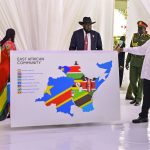Published on 13/05/2025
Government has introduced the Uganda Peoples’ Defence Forces (UPDF) Amendment Bill, 2025—an anticipated and potentially controversial piece of legislation aimed at restructuring military courts that were outlawed earlier this year.
The Bill was tabled on Tuesday by Defence Minister Jacob Oboth-Oboth during a plenary session chaired by Speaker Anita Among. It seeks to streamline the operations of military courts in accordance with the Supreme Court’s guidance in the landmark Attorney General v. Michael Kabaziguruka decision delivered on January 30, 2024.

In that ruling, the Supreme Court held that the General Court Martial is constitutionally established to function solely as a disciplinary body for military personnel, and therefore lacks jurisdiction to try civilians. The Court ordered the immediate transfer of all criminal trials involving civilians from military courts to civil courts, and further ruled that military officers facing capital offenses should be tried in the High Court, not by the army’s disciplinary committees.

In response, the UPDF Amendment Bill proposes significant reforms to align military judicial processes with the Supreme Court’s directives. Speaker Among referred the Bill to the joint Committee on Defence and Internal Affairs and the Committee on Legal and Parliamentary Affairs. Stephen Mugabi Baka, Chairperson of the Legal and Parliamentary Affairs Committee, was designated to lead the joint committee.
“This is a straightforward Bill,” said Speaker Among. “I expect it back before the end of the Fourth Session.”
DOWNLOAD YOUR COPY
Proposed Structure of Military Courts
The Bill proposes a three-tiered Court Martial system:
- Clause 35 seeks to amend Section 192 of the UPDF Act to establish a Unit Court Martial. This court will handle offenses with a maximum sentence of five years. The court will be chaired by a Captain with legal qualifications (a law degree and a diploma in legal practice), and will include members such as an administrative officer, political commissar, Regiment Sergeant Major, a junior officer, and a private. Appeals will be heard by the General Court Martial.
- Clause 36 proposes a Division Court Martial under Section 193, to handle offenses punishable by custodial sentences exceeding five years, excluding capital offenses. It will be chaired by a Lieutenant Colonel who is an advocate of the High Court. The panel will include two senior officers, two junior officers, a political commissar, and a non-commissioned officer. Its decisions will also be appealable to the General Court Martial.
- Clause 38 amends Section 195 to establish a General Court Martial to try capital offenses, including those punishable by death. The court will be chaired by a Brigadier General with legal qualifications equivalent to a High Court Judge. Chairpersons of all military courts will be appointed by the High Command in consultation with the Judicial Service Commission and will serve a three-year term, renewable once—a departure from the current one-year tenure.
Civilians Under Military Law
The Bill also proposes a new Section 117A, detailing specific categories of civilians who would be subject to military law, including:
- Persons voluntarily accompanying military units in active service;
- Individuals working under contractual terms with the army that subject them to military law;
- Those found unlawfully possessing military arms, ammunition, or classified equipment;
- Persons aiding or conspiring with members of the armed forces;
- And individuals unlawfully possessing or wearing UPDF uniforms.
Civilians falling under these categories may be tried for offenses such as murder, aggravated robbery, kidnapping with intent to murder, treason, misprision of treason, and cattle rustling.
Additional Reforms in the Bill
Spanning 89 clauses, the Bill proposes sweeping changes to the UPDF Act, including:
- Clause 7: Streamlines the composition of the High Command, the UPDF’s top decision-making body. Retired officers like Maj. Gen. (Rtd) Mugisha Muntu, who have joined partisan politics, will cease to be members—ending longstanding controversies.
- Clause 19: Amends Section 70 to revise the army’s pension scheme.
- Clause 24: Establishes a Pensions Appeals Board to hear grievances from retired personnel.
- Clause 18: Introduces Section 69A to provide compensation for injuries and disabilities sustained in service, including monthly disability payments and helper allowances.
- Clause 28: Introduces Section 115A to offer healthcare coverage to soldiers who develop service-related illnesses or injuries.
- Clause 2: Officially establishes the Special Forces Command (SFC)—an elite unit that protects the President—as a fully fledged service of the UPDF, joining the Land Forces, Air Forces, and Reserve Forces.
- The Bill also designates the Deputy Chief of Defence Forces to serve as the Inspector General of the Army.
If passed, the UPDF Amendment Bill, 2025 would bring sweeping changes to Uganda’s military justice system, redefine the scope of military jurisdiction over civilians, and restructure internal military administration in line with constitutional demands.








